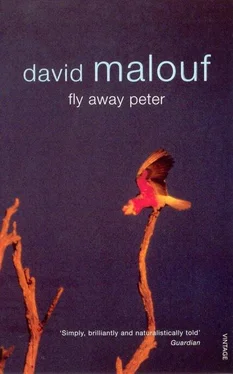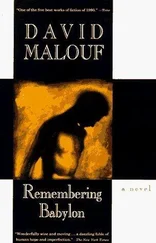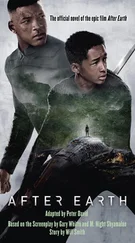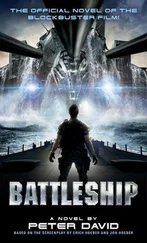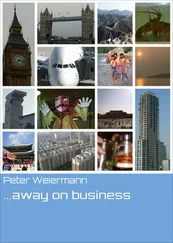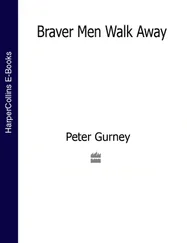He began, half-crouching, to move ahead. It was like advancing into a bee-swarm. The air was alive with hot rushing bodies that knifed down and swung hissing round his ears.
‘Is that you Jim?’
It was Bobby Cleese. He was never so glad to see anyone in his life.
He scrambled to Bobby’s side and they started forward together, then with fiery stars chopping at the earth again, they fell, together with others, who had also appeared as if from nowhere, into a wet ditch. From there Jim could see more of their lot over to the right.
So he wasn’t lost after all. He had found the company, and might have considered his time out of all this a dream, a fear of what he might do rather than what he had done, if it weren’t for Wizzer. Wizzer’s face, and Wizzer’s grip on him when they had wrestled together in the mud, were too real, and too humbling in his memory, to be dismissed.
‘I was scared silly back there,’ he whispered into Bob Cleese’s shoulder. He needed to go forward now with a clear conscience.
‘ You were scared,’ Bob said, and they both giggled. Jim felt himself delivered into his own hands again, clean and whole — what did it matter if he got killed? — and discovered a great warmth in his heart for this fellow Bob Cleese, whom he had barely known till now. He was a bee-keeper back home. That was all Jim knew of him. A thin, quiet fellow from Buderim, and it occurred to him as they lay there that they might understand one another pretty well if there was a time after this when they could talk. Everything here happened so quickly. Men presented themselves abruptly in the light of friends or enemies and before you knew what had happened they were gone. Wizzer! It was odd to recall that not much more than a year ago he had been waiting, in what he thought of as a hypnotized state, for life to declare itself to him and make its demands.
Meanwhile, one of the others in the ditch had turned out to be an officer. Jim didn’t believe he had ever seen the boy before, but he must have; it was the light. He was one of those fellows who were always clean. Even out here in the mud he looked perfectly brushed and scrubbed. His round face shone.
‘Listen men,’ he whispered, lifting his chin. He seemed filled with boyish nobility, playing his part of the junior officer as he had learned from the stories in Chums. He was very convincing. ‘We’re going forward, right?’
‘It’s a mistake,’ Jim thought, whose own youth lay so far back now that he could barely recall it. ‘This kid can’t be more than twelve years old.’ But when the voice said ‘Right men, now!’ he rose up out of the ditch and followed.
The boy was immediately hit, punched in the belly by an invisible fist and propelled abruptly backward. He looked surprised. ‘Unfair!’ his blue eyes protested. ‘I wasn’t ready. Unfair!’ He turned regretfully away, but Jim had no opportunity to see him fall. He had already thrown himself into yet another shallow hole and was, this time, with two quite different men. Bob Cleese was ahead somewhere, or maybe behind.
‘Will it be like this,’ he wondered, ‘all the way to Berlin?’
It was later, after another brief rush forward, that he and Bobby Cleese found themselves in the same shell-hole and were stranded there all night and all the next day as well, not twenty feet from the German lines. So they did have time, after all, and that night, and all the next day, they could hear Germans shifting their feet on the duckboards, striking matches to light their pipes, rambling in their sleep, and behind them, in no man’s land, their own wounded groaning or crying out for help. To shut out the sounds, and to keep their spirits up, Bob Cleese had told about the fishing at Deception in a low, calm voice that quieted in Jim a swarm of confused terrors and set them smokily asleep.
It might have seemed, as the day wore on, that they would never get out. But they forgot that as their limbs unfroze at last in the yellow sunlight. The smoke of cookfires trickled up. They smelled bacon. And men could be heard going about their peaceable daylight tasks. Birds appeared, and Jim shyly identified them. In the afternoon they slept. Once you put to one side the notion of the danger you were in, and the possibility when night returned of sudden death, it was almost idyllic that long afternoon in the sun and the whispered talk.
They got back that time. It was later, much later, in June, that Bobby Cleese died. But by then more than a third of the battalion had disappeared and been replaced. Jim was a veteran. He had fought in every part of the line around Armentières: at Houplines on the L’Epinette salient, at Ploegsteert, at le Bizet. He had been in a great battle.
It was while they were at Pont de Nieppe, waiting to come up to the battle, that Bobby Cleese was killed. The Germans shelled their billets with gas-shells, first tear gas, then phosgene. There was utter confusion and they had to abandon the town and sleep in the fields. Bob Cleese got a bad dose but didn’t die till two days later.
Jim’s company, by then, had been led in the dark through a maze of trenches to their old position at Bunkhill Row, and it was from there, just before dawn, that he saw the mines go up. The whole earth suddenly quaked under their feet as if an express train were rushing along below. There was a mighty roar. A cloud that bore no relation to the sound began slowly to rise westward. Like a pink and yellow rose made of luminous dust, it bloomed above the skyline, and climbed and climbed, till the sky in that quarter was entirely choked. It turned grey, and its smell as it withered was of charred flesh. When the smoke dispersed at last the landscape on every side was touched with flame. One whole hillside, over towards Hollebeke, beyond what remained of Ploegsteert wood, lay open and aglow, as if the door of a blast furnace had been thrown open and the horizon all round was lit with the reflection of it. It was like the mouth of hell. They rose up on a signal and poured into it.
Two days later, when they pulled out of the lines again, Jim got permission to go up to the hospital and find Bob.
It was a fine warm day, and in the aftermath of something very like a victory a holiday atmosphere prevailed. Weary men were making their way back out of the lines and many were wounded; others, more cruelly maimed, rode in closed wagons and you could hear their groans; but they were moving away from the battle zone into cleaner air and a glimpse of green and that made all the difference. The great pall of yellow smoke that hung over the battle-lines was well behind them and the sky ahead was blue. Jim especially felt light-footed and easy, and was happy to be striding out on his own with a twelve-hour pass in his pocket and the prospect of seeing his friend. He walked at first, in a great press of men, then accepted a lift on the back of a lorry, then further along rode for a bit on one of the guns. He met a blond fellow with no teeth who tried to sell him a safety razor. Another bearded soldier, very dirty and with no distinguishing tabs on his uniform, which seemed all odds and ends of other men’s castoffs, had a stack of things on a groundsheet whose praises he sang in a high sing-song voice like a spruiker at the Show. There was a Mills bomb, a Prussian helmet with a bullet-hole in it, two watches, one with a metal band, a blue neckerchief, a revolver, a torch and a very real-looking glass eye. Jim didn’t want any of these things, nor the gold fillings the man showed him in his dirty palm, but he inspected them along with others and wondered that the man had time for so much private industry. He accepted another lift in a field ambulance and played a short game of blackjack with two stretcher-bearers, who lost a shilling apiece. It was when he got down from the ambulance, just on the outskirts of the hospital, that he saw the crowd, and approaching the edges of it and pushing through was presented with something marvellous.
Читать дальше
